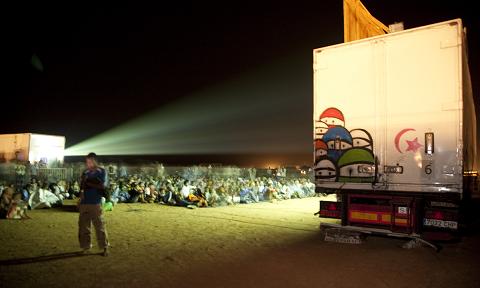Western Sahara’s eighth Sahara International Film Festival (known as FiSahara), the world’s most remote film festival, took place in early May this year deep in the Algerian desert.
The festival is located in a refugee camp 130 miles from the nearest town in the Algeria desert and aims to offer entertainment and educational opportunities to the refugees as well as raise awareness of a forgotten humanitarian crisis. The refugees are Saharawi’s from Western Sahara – occupied unlawfully by Morocco in 1976 – and an estimated 165,000 of them have lived in four camps for over three decades.
Visitors to the festival live with refugee families sharing their tented or mud-brick homes. The hottest hours of the day are spent sitting on the carpeted floor drinking endless cups of sweet tea with Saharawi hosts. There are no paved roads, no sources of food or water and during the heat of the day a thermometer on a wall can register 120 degrees. One day, during in a sandstorm, it became very clear why the area is known locally as the “Devil’s Garden.”
Among this year’s visitors was former United Nations Assistant Secretary-General Francesco Bastagli who resigned from the UN in 2006 in protest over UN inaction on Western Sahara. Mr Bastagli expressed frustration at the UN Security Council’s failure last April to extend the mandate of the Peace Keeping force in occupied Western Sahara, to include human rights monitoring. “Whether it’s conflict prevention, basic human rights or responsibility to protect, Western Sahara is the long-neglected obligation of the international community” he said. Ruphus Matibe, head of a delegation from South Africa’s Department of Arts and Culture, agreed, pointing out that a key component of the ANC liberation movement’s victory was “prolonged international pressure.”

“I liked the film about the boy in the sea,” said 14-year old Sidi Hassan referring to Jermal, an Indonesian film about a twelve-year-old boy sent to work on an isolated fishing platform in the Malacca Straits. “He was surrounded by water just as we are surrounded by sand.”
At a dusty red carpet ceremony on the final evening, the White Camel award for best picture was picked up by film director Gerardo Olivares for his 2010 film ‘”Among the Wolves.” Actor Luis Tosar picked up the Jury Prize for the Spanish movie “Even the Rain.” If there had been an audience prize it would probably have gone to Al-Yidar for his film, “The Wall”, a documentary about the 1,500 mile wall in the desert built by Morocco that divides Western Sahara in two. “I have been to the wall to protest but landmines stopped me from getting too close,” Admed Deidi tells me. “This film made me see the wall in a new way.”
Some of the films shown were made by refugees themselves and 22-year-old Najla Mahamed believes that Saharawi are naturally good story-tellers. “Living in camps has forced us to develop our imaginations” she says. “From your earliest days you are force to imagine your homeland. As you grow up that imaged place grows up with you.”
Stefan Simanowitz is a writer, journalist and broadcaster. He chairs the Free Western Sahara Network (www.freesahara.ning.com) and helped to coordinate this year’s FiSahara festival. Photographer Alberto Almayer’s website is www.albertoalmayer.com
